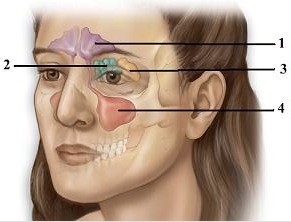 Which sinus does the number 4 indicate?
Which sinus does the number 4 indicate?
A. Ethmoidal sinus
B. Sphenoidal sinus
C. Maxillary sinus
D. Frontal sinus
E. Sagittal sinus
Answer: C
You might also like to view...
The heart has been estimated to consume 20-30 times its own weight in ATP each day, and mitochondria comprise about 30% of the volume of a cardiomyocyte. In the normal adult heart, fatty acids supply about 60-80% of the organ’s energy needs, with most of the remainder being supplied by glucose. Mitochondrial fatty acid breakdown to yield ATP is called beta oxidation (Chapter 25). When oxygen supplies are limited, cardiomyocytes increase their use of glucose. Aerobic glucose metabolism consumes less oxygen than beta oxidation, and anaerobic glycolysis does not depend on oxygen.
a. increase glucose consumption. b. decrease glucose consumption. c. increase fatty acid consumption. d. increase protein consumption.
What does the pancreatic duct directly join to?
A) jejunum B) liver C) ileum D) duodenum
In a healthy patient, the thyroid gland
A. consists of two lobes that are connected by an isthmus. B. does not move with the thyroid cartilage when swallowing. C. secretes thyroxine, which slows down the metabolic rate. D. is clearly visible and easily palpated.
The spleen is located in the ________ region of the abdomen.
A. lower right B. upper right C. upper left D. lower left